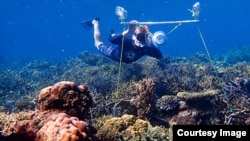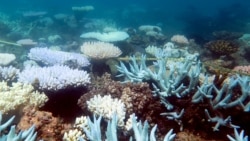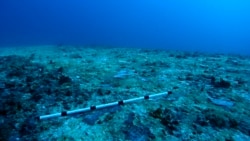A team of scientists says that playing sounds underwater can get fish to return to areas with severely damaged coral reefs.
In an experiment, they found fish returned after hearing recordings of the sounds of a healthy ocean reef.
The international team included scientists from the British universities of Exeter and Bristol, as well as Australia’s James Cook University. The research results were reported in the publication Nature Communications.
The scientists placed underwater speakers in areas where coral had been dying in Australia’s northern Great Barrier Reef. They played the sounds over a period of about a six weeks in 2017 and studied the results. The team reported that twice as many fish arrived in areas where the sounds of healthy coral were played.
The sounds also led to a 50 percent increase in the number of species present in the area, the researchers found. Among the arriving fish were species that feed on all major food sources.
The researchers noted the importance of having many different kinds of fish return to the area. Different species of fish perform many activities that support the ocean environment and sea life. “Damaged reefs have a higher chance of recovery if they have healthy fish populations,” the scientists wrote in the report.
Steve Simpson is a professor at the University of Exeter who helped lead the research. He said in a statement that “healthy coral reefs are remarkably noisy places.” They contain the sounds of many kinds of shrimp, fish and other sea creatures. Young fish listen for these sounds when they are looking for a place to settle, Simpson said.
He added that reefs “become ghostly quiet” when they suffer destruction that is usually related to human-caused pollution. Coral damage can cause unappealing smells and sounds that drive shrimp and fish away. But the experiment suggested that the use of underwater loudspeakers was an effective way to get young fish to come back.
Mark Meekan is a fish biologist with the Australian Institute of Marine Science. He said in a statement that the return of these fish is the first step to seeing major improvements in reef health. "Recovery is underpinned by fish that clean the reef and create space for corals to regrow," he said.
Tim Gordon was another member of the research team from the University of Exeter. He says he believes sound can be used to bring back dead coral in areas suffering major destruction in oceans across the world.
"Boosting fish populations in this way could help to kick-start natural recovery processes, counteracting the damage we’re seeing on many coral reefs around the world," Gordon said.
University of Bristol professor Andy Radford said the underwater sounds are a promising way to fight coral reef damage at the local community level. But he noted that other threats need to be reduced as well. These include climate change, pollution and overfishing.
Gordon added, "From local management innovations to international political action, we need meaningful progress at all levels to paint a better future for reefs worldwide."
I’m Bryan Lynn.
Bryan Lynn wrote this story for VOA Learning English based on reports from Nature Communications, the University of Bristol and the University of Exeter. Mario Ritter, Jr. was the editor.
We want to hear from you. Write to us in the Comments section, and visit our Facebook page.
____________________________________________________________
Words in This Story
coral reef – n. underwater structures made up of stony corals
species – n. a group of plants or animals that share similar qualities
remarkably – adv. in a way that makes you feel surprised
ghostly – adj. like a ghost in appearance; unnatural
underpin – v. give support or strength to something
kick-start – v. to make something start to happen
innovation – n. a new idea or method of doing something








